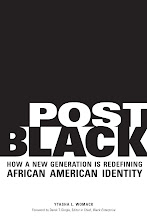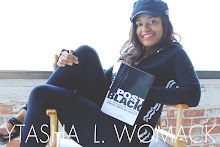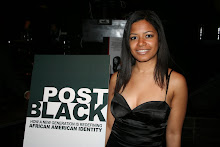
Beth Gunzel is a Chicago based community advocate, working with microfinancing, urban agriculture and workforce development. She is Program Manager for Employment Training at Growing Homes a nonprofit/social enterprise that produce organic vegetables in the inner city. Raised by white adoptive parents, Gunzel wrestled with identity issues that were only complicated when she lead a microfinancing program in the Dominican Republic. As for her DR experience - “Here I am in a black country with black people and they don't know what black is.”
YLW: You've dedicated your life to social service and food justice. Are your fellow GenX'rs and Yers boggled by your decision to ditch a corporate job?
BG: You have this upward mobility about being dedicating to an activity because it brings me power and privilege vs. I do what I do because it unleashes my innate potential of me as a human being. I see people struggling with that. I struggle with this. But I have to really center myself. As a little girl I knew this work was what I was going to do.
YLW: Do you take issue with upward mobility for the sake of money and status?
BG: I think that what people are doing on an individual basis addresses those wrongs of the past.
YLW: You mean exclusion, or African Americans being excluded historically?
BG: Yes. But, it's a paradox. We're trying to move from exclusion in a number of areas, but I wonder are we doing it in a way that's challenging the larger issues that created that exclusion to begin with. Because that situation exists for others. So if blacks move to heights never imagined, believe me there will be another group that comes in and fills that void. My concern is are we engaging in the humanistic values.
YLW: How did you get involved in organic urban farming?
BG: I moved to the Dominican Republic after I got my degree in Urban Planning and Policy - to head a micro-financing program. I was working with farmers, urban entrepreneurs, people selling food or doing hair. The grant that paid my salary was the Global Food Crisis Program. I began understanding these issues of food production, who's benefiting from what, and how food gets to our tables. I was thinking a lot about food security issues.
YLW: What's a food security issue?
BG: The movement is still trying to come up with a concrete definition. But food security is rooted in local reliance. Communities, not just low income, but even the city could be considered food insecure in that most of the food is imported. If there was some big catastrophe where would we get our food from? So our movement deals with that, in addition to getting healthy food to communities.
YLW: How did you wind up in Chicago?
BG: I came back to Chicago at the worse possible time, in 08 when they announced the recession. I thought about getting another masters in crop sciences. Then I saw an ad for Growing Homes. I was a little intimidated. Urban farming is different from helping farmers grow cash crops in the DR. But the job was focused more on the planning and upkeep of the farm, and it's a transitional program.
YLW: How does Growing Homes work?
BG: We welcome up to 25 individuals a growing season to work with us. They're trained in basic horticulture and soils, and they are involved in supporting the operations of this business. It's a way of getting people who face employment challenges to build resumes and to organize some things in their lives. In addition to the work, we do job readiness training, job management, food issues, and teach nutrition. Interns also work in sales, so they learn marketing, community outreach - getting people to know about organic produce. It's a pretty dynamic program.
YLW: How do you sell your produce?
BG: We sell our produce in Lincoln Park at Green City Market, through a CFA program (community supported agriculture), so when a person who wants our produce can buy a share before the growing season, and then they're provided with a box of produce every week. We also sell at our Englewood farmers market. We also have a farm stand at our Englewood office.
YLW: I'm a total city girl, so I have to ask, how do you grow food in the hood?
BG: We have three sites. One site in the Back of the Yards, 50th and Laflin, which is an outdoor plots. We have Marseilles , IL, a 10 acre, rural farm, 6 acres . In the Wood St./Englewood site, we do growing in hoop houses, so we grow in an unheated structure. The inside structure is in the shape of a hoop but it's covered in plastic. It works like a greenhouse, it captures the sun's energy and increases the temperature. So we can grow longer. We can grow plants that wouldn't be thriving outdoors right now. We can also grow earlier. We can do our first sales of produce in March, using the hoop house.
YLW: What do you grow?
BG: We grow pretty much everything. It depends on the season. We have carrots beets, leafy greens, arugula, kale, herbs of all king, basil cilantro, eggplant, tomato, watermelon, turnips, asparagus, strawberries, beans of all kinds.
YLW: Wow. How long does the program last?
BG: It's a six month program. It starts in April of every year. We graduated people in October.
YLW: How do the participants like the program? Are any of them thinking about doing food advocacy work or starting urban farms?
BG: You have people who say 'it's everything I needed, I feel more confident, my job search skills have improved,' and a couple of those people have been hired on with us. We also had people who said 'I don't want to learn how to farm, but I need a work history, I want to build my resume.' So although, they don't want to work in food advocacy, they got what they needed. We have other people who are thinking about getting into health, nutrition or culinary school.
YLW: What kind of food issues do low income communities like Englewood face?
BG: In Englewood the issue you have is that you don't have fresh healthy produce readily accessible to people. Also, people are in survival mode. How to get beets or kale may not be at the top of the list. They might just be trying to get calories.
YLW: Is there a high awareness of the need for organic food in the community?
BG: You'd be surprised at how much people do know. Englewood is a predominantly African American and the program participants are African American. People tell me they've been green all along, but green wasn't feasible anymore. People that I talk to have a lot of connection to the land. I don't know if it's a South side thing. But many of the participants either grew up on a farm, or they're parents grew up on a farm, or they have members who are still farming.
But for Americans, it's a difference between what we know we should be doing vs. what we do. So they might do beets and carrots one day. But it's about incorporating it in your daily life.
People need to know how to prepare things and feel economical. But they also need the confidence to change their identity, because it causes a lot of anxiety.
People need to know how to prepare things and feel economical. But they also need the confidence to change their identity, because it causes a lot of anxiety.
YLW: You were raised by adoptive white parents and you're biracial. Did that present any identity challenges for you?
BG: There's this feeling that biracial children in the 70s were put up for adoption not because your mom couldn't take care of you, but because this relationship was not accepted . You can't prove it, but a lot of adopted biracial kids my age feel that way and are starting to talk about it. Biracial kids can be given up for adoption for race alone.
YLW: I never knew that.
BG: There's the issue of being adopted and there's the issue of being black. Within my family there wasn't any type of contempt for people of color, but they couldn't protect me from what was outside of our home. My parents have never said anything about someone talking to them about adopting a biracial kid. I grew up in a cooperative neighborhood for people of different colors and sexual orientations, so I was very privileged. When I was 12, my mom didn't quite know how do deal with my hair, though.
My brothers had a lot of problems. They are white, and they had to defend me and be around people who talked about people of color. I liked heavy metal. I listened to that. I still do. And I was really proud of the groups I liked. I saved my money and would buy the Metallica T shirt. But in public, I would turn it inside out.
YLW: Why?
BG: Whites would think 'what is a black girl doing with a Metallica T-shirt?', but my friends of color, not just black but Mexican, Pakistani, would look at me and say 'that's white.' I wasn't listening to Bobby Brown or New Kids on the Block. I grew up not having any particular identity. But as I grew up, it helped me talk to all people. At lunch, I didn't go to the black table or the white table, I ate outside, and they would come to me. I dealt with it by learning to speak Spanish.
YLW: How did that lead you to learn Spanish?
BG: I'm looking at this from an adult perspective. I wonder if it was me trying to escape from these rigid expectations.
YLW: Rigid expectations as they related to you as an African American person?
BG: Right. I think I felt that this language was mine and mine alone. I grew up in among a large Mexican population. Some of it was I did well in it, and I wasn't a good student. It's not that I wasn't smart, I just didn't apply myself. Learning this language was really a passport, not just to traveling but to having other human interactions. You learn about different things. I was really interested in Afro Latino countries. That's what brought me to the Dominican. It's a country of blacks who have the same background as we do, but they speak Spanish. You can speak another language and be black. There are a lot of black people in Latin America, Panama, Nicaragua, Columbia . . .
YLW: I regretted that I didn't master French.
BG: Me, too. In the D.R, they have over 1 million Haitian immigrants who speak French and creole. I learned some creole.
YLW: Did living in the Dominican Republic impact your views on black identity?
BG: The question 'what does black mean?' is an American thing. Black doesn't exist there. I was wheat colored. And they told me that. Black is Haitian, or African. There's a strict color hierarchy. That was weird for me. My parents never told me I was light. I didn't know what that meant until I started hanging out with black people. My parents never said I was biracial. They said I was black. They didn't bring it up until they saw me reading all this black literature, like Malcolm X. She said why are you reading about Malcolm X, I said I want to learn about my history. And she said, don't forget that you're half white, which she never said before.
Anyway, I go to DR and I wanted to go to a place where there are other black people, and when I get there, they're like, who are you calling black?
Anyway, I go to DR and I wanted to go to a place where there are other black people, and when I get there, they're like, who are you calling black?
YLW: Was it confusing living in a black country that had a different concept of black identity?
BG: It produces a lot of anxiety because we've fought a lot for that identity, and when it doesn't exist in other places, you're like, wow. Then, and I'm not trying to make light of it, but it looks silly. It's a framework that's useless in terms of separating people and resources based on these things. I got to the point in the DR, where I figured they're lucky that they don't have to deal with all this, 'you're black and what does that mean.' What does it really mean to be black? We identify ourselves on a foreign concept. We came as Africans, or people of different ethnicities, we came as free people, as explorers.
YLW: But asserting black identity at home was very important for you. Did it feel weird being in the DR and they had no idea what you were talking about?
BG: At first it was difficult, in defending black people at home, then when I get to the DR, they're like 'who are you calling black? Then I realized, it wasn't necessary in their culture to have that definition of black. Then I said wow, this is a really huge social construct tied to the economic structure.
YLW: Why do you say that?
BG: My Haitian friends called themselves black, they identified with African Americans, but my DR friends did not. And they both look the same. In Haiti, they had the chattel slavery system, where there was a strict distinction between black and ruling class. But in DR they didn't have that. There wasn't a need for a strict concept of black and white in their country. The DR was a defunct country, the Spanish who moved there married African people. So I have a concept of black, I 'm moving to a black country that doesn't have a construct of black. Who am I?
YLW: But there is a concept of black in the Dominican Republic, they just don't apply it to themselves.
BG: When Dominicans come to the US they get schooled in it real fast. They're no longer looked at as Dominican unless they're really light. They get grouped in with blacks. But in the DR the term black is a oppressive political word against Haitians.
YLW: Do you think the concept of black identity should be abandoned?
BG: What I've found is it's a human need to have one – any identity. That goes across all time periods. People are intimately involved in shaping their identity. Although I'm critical, I'm sensitive to the need to know that. I still think it's a fascinating thing, the identities we come up with.
For more information on Growing Homes view. www.growinghomesinc.org.



Just want to say to Beth, thank you for sharing. Thank you for your passion & desire to make difference.
ReplyDeletePhlona Williams